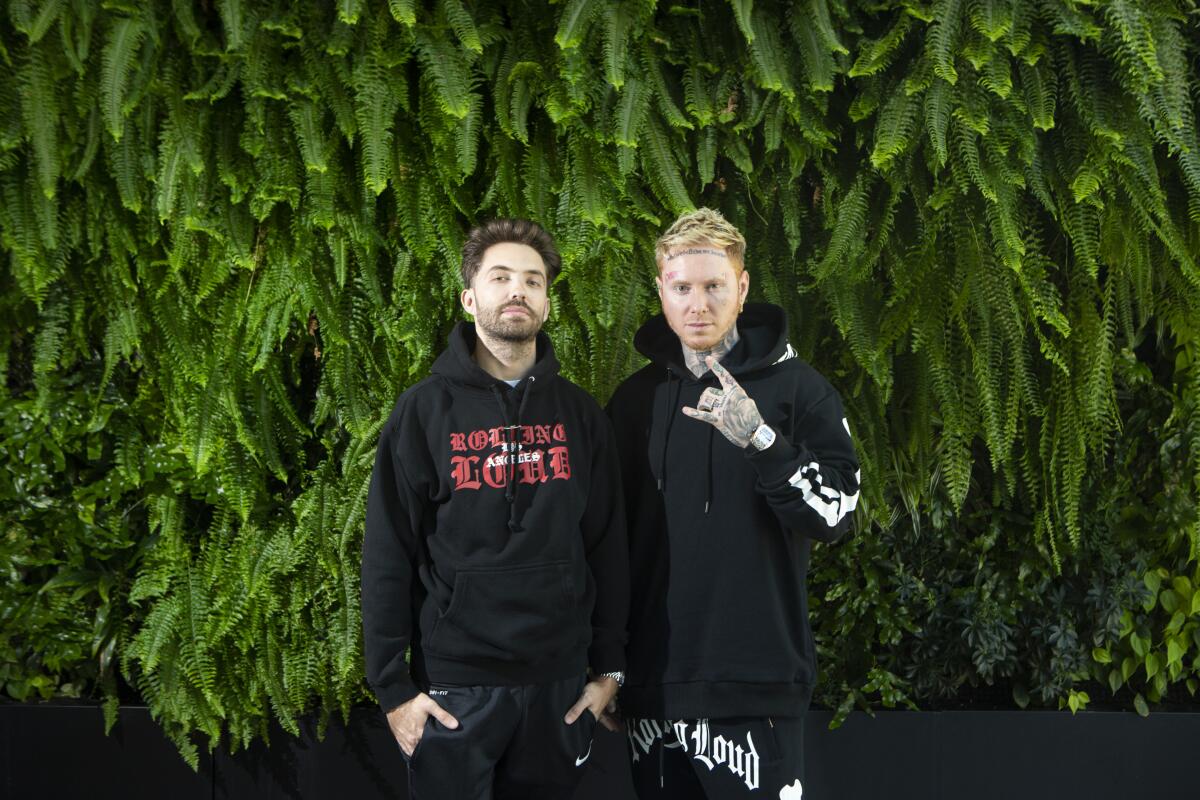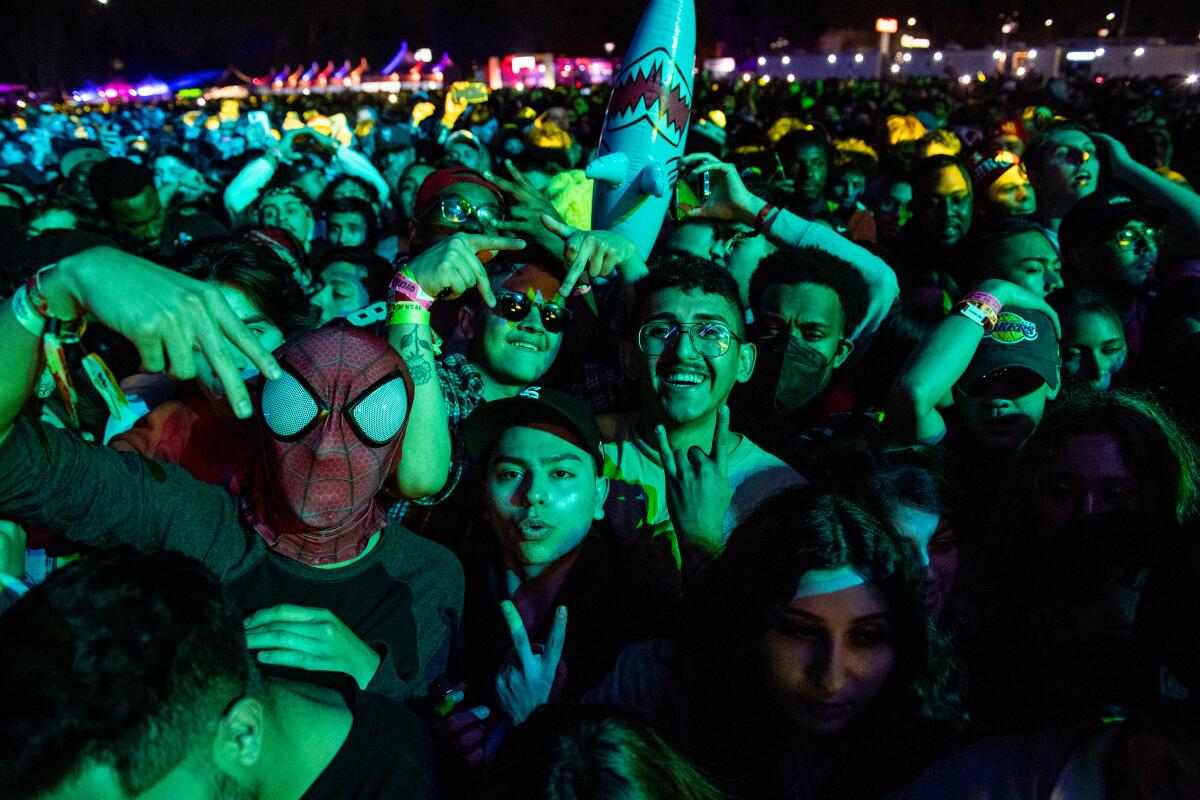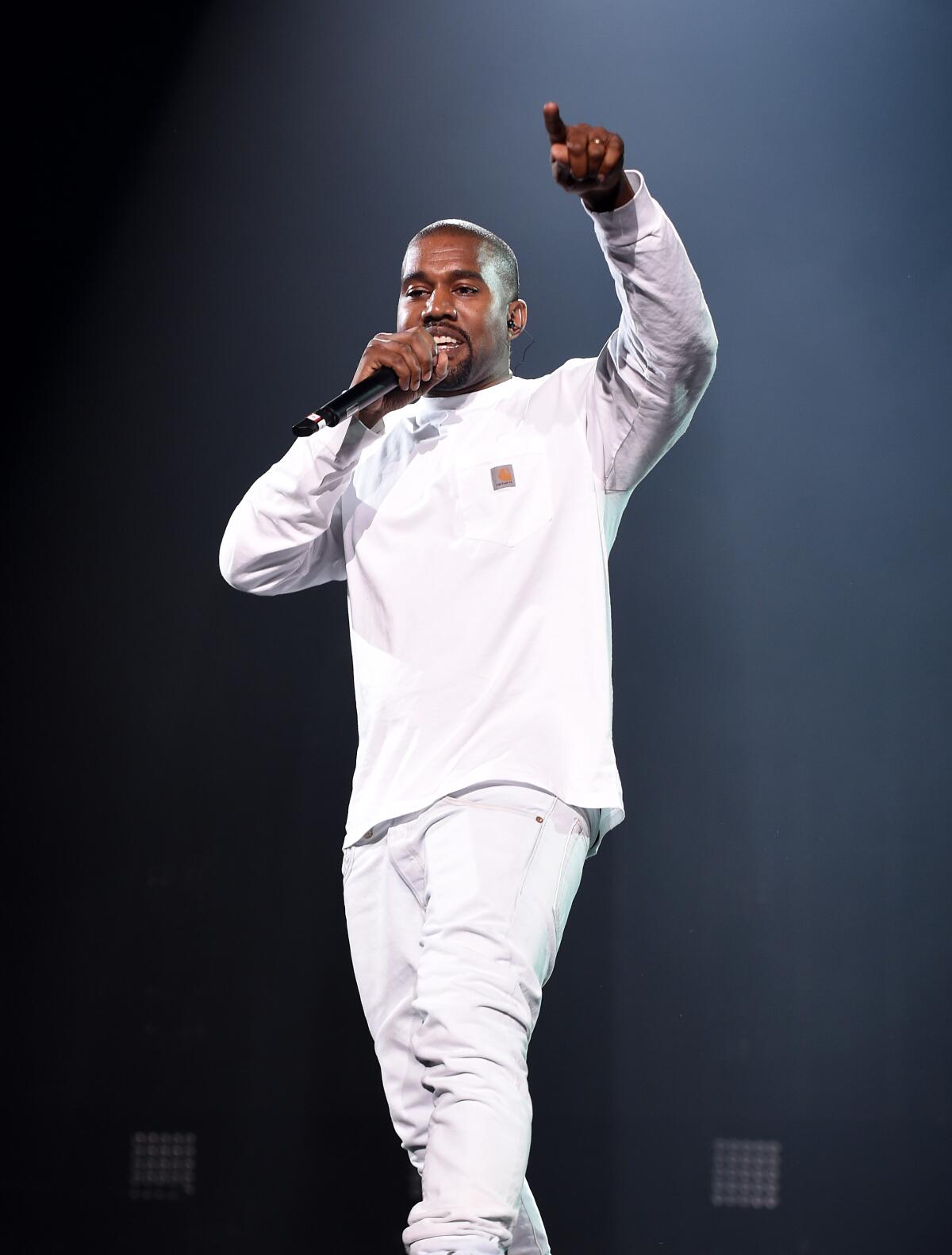R.C. Hogue grew up with Kanye West’s music. The rapper was “a top-three artist for me and a big part of my upbringing,” said Hogue, a 30-year-old from Los Angeles. Even after West supported Donald Trump, Hogue tried to “separate the art from the artist, because a lot of artists have done messed up things.” But he couldn’t forgive West for saying, in 2022, that he’d go “death con 3 on JEWISH PEOPLE” and praised Adolf Hitler.
Hogue was looking forward to this weekend’s 10-year anniversary tour of the Rolling Loud hip-hop festival in Inglewood — until he saw West’s name, now just Ye, added to Thursday’s bill. Hogue is likely staying home, at least for the night West will perform.
“Time heals a lot of wounds, but with Kanye, it’s a little too soon to start listening to him again,” Hogue said. “He’s shown no remorse, no sign of admitting he’s wrong, and there’s no excuse for antisemitism. It would feel weird to be there.”
West’s unexpected return to Rolling Loud — the biggest rap festival brand in the world — alongside his collaborator Ty Dolla Sign suggests the music industry may be tentatively welcoming him back.
Some rap fans see West as a roguish outlaw who beat cancel culture. Local Jewish communities worry that booking him adds a sense of impunity around hate speech. Experts wonder why an acclaimed and successful festival would risk booking an artist famous for both antisemitism and ongoing struggles with mental health.
“A lot of music festivals will drop artists to protect their reputation,” Hogue said. “But Rolling Loud is doing the opposite.”
Representatives for Rolling Loud declined an interview request to discuss West’s booking. West’s new booking agent, Cara Lewis, did not respond to an interview request.
In the years after West acknowledged his bipolar disorder and grief following the death of his mother, fans and the industry tried to put his erratic behavior in the context of his mental health challenges. West’s music meant a lot to fans like Hogue, and they didn’t want to cast him out.
Ty Dolla Sign, left, and Ye will headline Thursday night’s Rolling Loud bill in Ye’s first live performance in L.A. since 2012.
(Jordan Strauss/Invision/AP; Evan Agostini/Invision/AP)
Yet in 2022, his shocking outbursts led to the dissolution of his multibillion-dollar apparel deal with Adidas; he was banned from social media sites and dropped by his talent and booking agents, and left with no record label. West’s career — one of music’s most influential and lucrative — seemed in shambles.
In December, at a small Las Vegas listening party, West falsely cited “60 million of us in America, 60 million Jews in the world,” and shouted “Jesus Christ, Hitler, Ye, third party, sponsor that.” In January, West wore a shirt from the Norwegian metal band Burzum, whose founder Varg Vikernes was convicted of murder and inciting racial hatred.
Yet some corners of the music industry may be ready to get back in business with him.
“I was surprised when I first heard that Kanye was headlining Rolling Loud because it seemed unnecessarily risky for the festival,” said Dave Brooks, Billboard’s senior director of live music and touring. “Ticket sales seemed to be doing well, and the risk that Kanye would say something offensive, have a meltdown or refuse to complete his performance poses a real threat to Rolling Loud’s brand.”
But after a few other listening events went off without incident, “I think the decision makes more sense,” Brooks added. “Kanye and Ty have successfully completed five listening party events. The Rolling Loud guys are definitely using the performance to drive ticket sales and are positioning themselves to look very smart if the show goes off without any major disruptions.”
West’s performance, booked as a collaboration with Ty Dolla Sign under the aegis of ¥$, is still shrouded in mystery, but it will be his first live performance in L.A. since his co-headlining set with Drake at a benefit show in 2021. He was booked to perform at Coachella in 2022, but dropped out weeks before showtime.
The duo’s new album, “Vultures 1,” topped the Billboard album charts for two weeks in February. It was West’s first album to spend multiple weeks atop the charts since 2011, and yielded a number-one single “Carnival.” The album is packed with guest stars like Travis Scott, Playboi Carti and Chris Brown. (West been teasing a “Vultures 2” release soon)
If West felt chastened by his recent blowback, it didn’t show on the album’s title track, where he alluded to his recent career immolation. “How am I anti-semitic?” West raps on “Vultures.” “I just f-ed a Jewish b-.”
Danya Ruttenberg, a feminist rabbi and author of “On Repentance And Repair,” said she was “absolutely grossed out” when she first heard that lyric. “It’s as vile as any sexualization of a people.”
But she’s more worried that this weekend, tens of thousands of young rap fans will sing along, just a few miles from where a white supremacist group, in 2022, hung a banner over the 405 freeway saying “Kanye was right about the Jews.”
“Anyone feeling validated by Kanye will feel more comfortable perpetuating literally medieval hate speech after this,” Ruttenberg said, of his booking at Rolling Loud. “This performance makes Jews less safe.”

From left: Tariq Cherif and Matt Zingler, who are co-founders of the Rolling Loud Hip-hop music festival.
(Gabriella Angotti-Jones/Los Angeles Times)
Ruttenberg also noted the apology that West wrote on Instagram after his Las Vegas tirade – a mea culpa written in Hebrew. (“I sincerely apologize to the Jewish community for any unintended outburst caused by my words or actions. It was not my intention to offend or demean, and I deeply regret any pain I may have caused.”)
“Most American Jews don’t read Hebrew,” Ruttenberg said. “The idea that we’re this other people with a mysterious other language, or that our real home is Israel, that we’re a global enterprise connected via language instead of citizens of this country, is all part of same trope.”
Given the backdrop of the Gaza conflict, which has led to antisemitic and anti-Muslim hate crimes in the U.S., some worry about making an artist with a history of bigoted statements seem acceptable – even edgy and alluring.
“Kanye has done horrific damage as far as contributing to the never-ending tsunami of antisemitism in this country,” said rabbi Abraham Cooper of the Simon Wiesenthal Center, a Los Angeles-based Jewish human rights group. “The struggle is to keep bigotry out of the mainstream, and there’s nothing more mainstream than a concert with 100,000 people. Putting him front and center is a signal to others that maybe they can sign on too.”
Cooper met with the TV personality Nick Cannon in 2020 after Cannon made antisemitic remarks, and said he was impressed by Cannon’s willingness to examine his prejudice and apologize. West, however, has done little to change, Cooper said.
“If someone wants to make amends, take them seriously,” Cooper said. “I’m not a censor of anything in the arts, but when people like Kanye have taken hate and made it cool, it projects hate into the mainstream of culture at exactly the worst time for our community.”

Festival goers attend Rolling Loud at NOS Events Center on December 12, 2021 in San Bernardino, California.
(Timothy Norris/WireImage via Getty Images)
West has burned many bridges in music since 2016, when after a troubling rant onstage at a Sacramento concert, he was hospitalized for mental health reasons and canceled his tour. Most fans and industry figures sympathized with his mental health challenges and were ready to support him again, even as he later met Donald Trump in the White House.
Some promoters took a chance on him, and got burned.
In 2022, the production company Phantom Labs, which helped build the Coliseum concert with Drake, sued West, claiming they were owed “$7 million by Kanye in outstanding fees for work on various projects over the past year.” West’s last-minute Coachella cancellation in April of 2022 left the fest scrambling for a replacement headliner (they ended up booking Swedish House Mafia and The Weeknd). West was slated to headline Rolling Loud’s flagship Miami festival in July 2022, but reneged five days before showtime. He was replaced by Kid Cudi, who was heckled offstage by fans angry West wasn’t performing.
At the time, Rolling Loud’s Tariq Cherif told the Times that “we’d never had a headliner pull out until Kanye did, and we don’t take that lightly. The platform we built deserves respect, and we didn’t like it.”
West’s conduct grew more troubling. He wore a “White Lives Matter” t-shirt at Paris Fashion Week, and dined with Trump and the white supremacist Nick Fuentes, who worked on Ye’s ill-fated presidential campaign. That rattled his business partners, concert bookers and talent agencies, who cut ties under public pressure.
Rolling Loud’s gamble that West can still draw crowds will be a test of his viability as a touring act. The fest-opening set will be open to Rolling Loud fans who already purchased passes to see Nicki Minaj, Post Malone and Future, with a limited number of single-day passes just for West and Ty Dolla Sign’s set.
“If Kanye impresses fans with his performance at Rolling Loud, then he has a real shot at booking future festival dates and one-off concerts this summer,” Brooks said. “That’s what I would expect coming out of a really strong showing at Hollywood Park – five to eight festival dates through the end of the year, but I don’t think a tour in 2024 is realistic at this point.”

Kanye West performs during Puff Daddy and Bad Boy Family Reunion Tour at Madison Square Garden on September 4, 2016 in New York City.
(Dimitrios Kambouris)
West previously complained in a February Instagram post that “when I call, people say there’s no [open dates] for me, and you know why that is.” His booker, Cara Lewis, was West’s agent at WME and CAA during the peak of his commercial career, when he was one of the most ambitious live performers in the world. His listening events for “Vultures 1,” like one last month at Chicago’s United Center, still pulled big crowds. Billboard estimated that his five listening party events for “Vultures 1” grossed $12 million.
“Many people – both fans and executives inside of the music industry – are struggling to make sense of Kanye’s return in light of all the antisemitic and terrible things he has said or written on social media,” Brooks said. “But there is clearly still a big market for Kanye and people willing to work with him. Some members of Kanye’s own inner circle are Jewish, and I assume that those individuals aren’t just motivated by money, but care about him and want to help. “
That troubles Ruttenberg. “This fest’s organizers can count themselves as responsible for giving him this platform,” she said. “It’s extremely unhelpful to say the least. This fest has basically said Jews, which include Jews of color, are not welcome. The other performers have some hard questions to contend with now.”
The Times reached out to several top artists at Rolling Loud, including the Jewish rapper BLP Kosher and Nicki Minaj, who denied West clearance of a 2020 verse for use on “Vultures 1,” about sharing a bill with West. All declined to comment or did not respond.
One could draw some parallels to West’s frequent collaborator Travis Scott. After 2021’s Astroworld disaster, where ten fans were crushed to death as Scott performed, Scott took a year off from performing and donated to affected families. He was not criminally charged, though many lawsuits remain. He later returned to headlining stadiums and major festivals without incident.
To judge by comments on Rolling Loud’s social media, many fans seem excited – or at least neutral – about West’s comeback performance, which will be a major event in hip-hop no matter what happens onstage. “As for the fans who support him, I assume they have either forgiven Kanye for his past comments,” Brooks said, “or they simply don’t care or in some cases, sadly, agree with Kanye.”
Longtime fans like Hogue are mulling those hard questions too, as they decide whether or not to attend Rolling Loud.
“Rolling Loud probably wanted to add value to their lineup and their number one priority is selling tickets, but it does make me raise an eyebrow,” Hogue said. “If you have a platform like this, you do have some duty to be moral.”
This story originally appeared on LA Times

